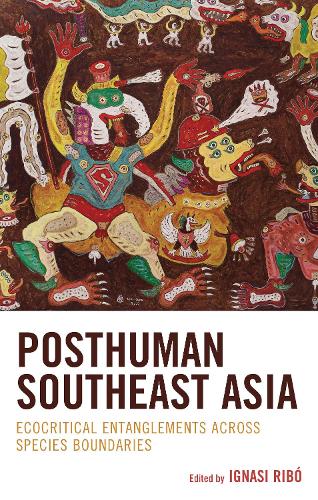
Posthuman Southeast Asia: Ecocritical Entanglements Across Species Boundaries
(Hardback)
Publishing Details
Posthuman Southeast Asia: Ecocritical Entanglements Across Species Boundaries
By (Author) Ignasi Rib
Contributions by Ignasi Rib
Contributions by Soorya Alex
Contributions by Paloma Chaterji
Contributions by Catherine Diamond
Contributions by Rashmi Gaur
Contributions by Tran Ngoc Hieu
Contributions by Min Seong Kim
Contributions by Li-Ru Lu
Contributions by John Charles Ryans
Bloomsbury Publishing PLC
Lexington Books/Fortress Academic
5th February 2025
United States
Classifications
Professional and Scholarly
Non Fiction
Regional / International studies
Comparative literature
809.93360959
Physical Properties
Hardback
308
Width 152mm, Height 229mm
Description
Posthuman Southeast Asia: Ecocritical Entanglements Across Species Boundaries explores the posthuman in Southeast Asia from various ecocritical perspectives and encourages further and deeper entanglements between ecocritics and the bountiful, but also threatened, multispecies ecologies of this region. Southeast Asia is an area where humans and nonhumans have always been deeply entangled, from the indigenous and ancient traditions of animism to the variegated and blooming creativity of contemporary literature, art, music, drama, film, and other media. This book expands and enriches Southeast Asian ecocritical scholarship by incorporating posthumanist and new materialist perspectives. Across twelve chapters, this volume explicitly engages with Southeast Asian texts, cultural practices, and environmental issues from the broadly conceived theoretical framework of posthuman ecocriticism. They provide a uniquely inflected perspective on the literary, multimedia, and artistic dimensions of contemporary nature-cultures in Southeast Asia, as part of a concerted effort to disclose the complex entanglements of humans and nonhumans across the region.
Reviews
The pathbreaking volume Posthuman Southeast Asia: Ecocritical Entanglements Across Species Boundaries, edited by Ignasi Rib, offers a rare insight into ways in which various literary and cultural texts across Southeast Asia negotiate the relatively new terrain of posthumanism through an ecocritical lens. The book is unique in thoughtfully combining Anglo-American theory with analysis of hitherto unavailable narratives accessed from native Southeast Asian languages. By doing so, it offers native and insider perspectives on ways in which indigenous worldviews on the more-than-human world merge with contemporary cutting-edge theories.
The chapters range from an analysis of narratives surrounding the unique fruit durian, endemic to the region and a phyto-investigation of Indonesian poems on the banana and the papaya fruits, to exploring the animation landscape of Southeast Asia as posthuman ecoscapes and discussing animals and performance. These are only a few examples of the exciting new scholarship that the volume offers. All these converge to present the enriching developments that are occurring all over Southeast Asia in the field of posthuman ecology. This is a must-read critical volume that opens a whole new world of academic insights that augment yet challenge, contravene yet support Western perspectives by offering unique insights from ancient and modern Asian traditions.
Humans are not the center of everything. The books discursive use of critical posthumanism reminds us human readers that our planet is shared and must be shared equitably. The essays engagement with posthumanist issues in Southeast Asian literature and culture attests to the regions growing interest in what lies beyond human. -- Lily Rose Tope, University of the Philippines Diliman
Author Bio
Ignasi Rib is associate professor of comparative literature at the School of Liberal Arts, Mae Fah Luang University.
